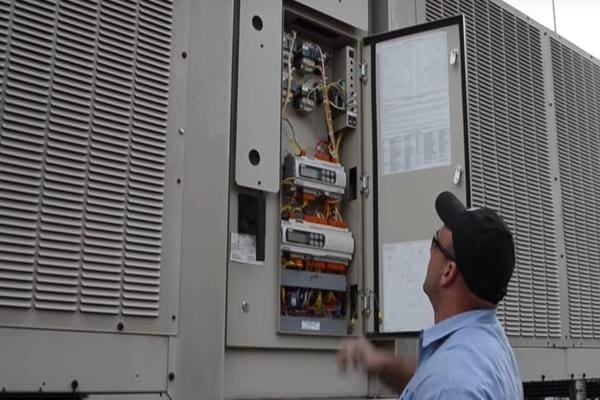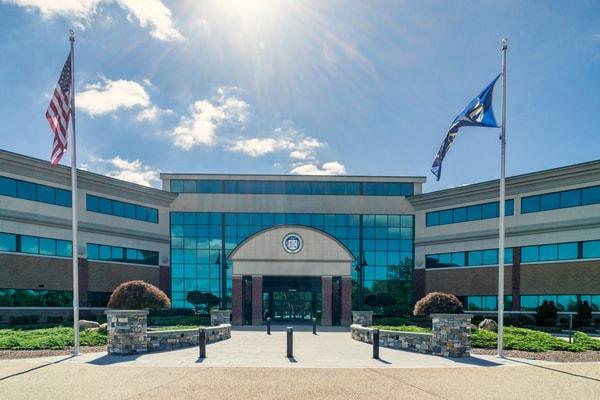According to the United States Bureau of Labor Statistics (BLS), HVAC (Heating, Ventilation, and Air Conditioning) technicians and engineers are in high demand across the country. If you’re looking for a certification program to help you get a head start in the HVAC industry, read on below.
With the increasing demand for and complexities involved in HVAC technologies, HVAC technicians will continue to find job opportunities. The need for qualified professionals means that you will need to develop the right set of skills and know-how to perform installation, repair, and maintenance work.
Table of Contents
What is an HVAC Certification License?
-
Apply for an HVAC degree at NEIT!
Loading…
/**/
HVAC technicians are responsible for installing, maintaining, and repairing heating, ventilation, air conditioning, refrigeration units, and systems in various commercial and residential spaces. As mentioned above, with the increasing complexities in HVACR technologies, aspirants must acquire certification to cater to today’s customers’ needs.
Although not mandatory in all states, an HVAC certification license is a great way for HVAC technicians to upgrade their skill set and showcase their credentials and competency to potential employers or customers.
The Benefits of Becoming a Certified HVAC Technician
Being an HVACR certified technician comes with its own set of advantages. Here a look at some of the top benefits of getting certified:
- Understanding the fundamental principles of HVAC systems and the science behind it
- Develop a wide range of skills in heating, ventilation, air conditioning, and refrigeration
- Be adept at analyzing the air quality, gauging humidity levels, and understanding temperature control mechanisms
- Get the edge over other HVAC technicians applying for the same job as you in the market
- Get opportunities to work on large-scale projects and showcase your skills and competencies
- Show your clients and employers that you have the theoretical and practical proficiency required for the job
- Increase your earning potential – an HVACR certified technician tends to command a better remuneration than their uncertified counterparts.
How to Become Certified – HVAC License Requirements
So, let’s get down to business. How, exactly, do you acquire your HVAC certification? Since the certification rules vary from state to state, it isn’t easy to zero-in on one single approach to getting certified. To make things easy for you, we have listed the steps to become certified.

The HVAC Certification Process Explained
High school diploma
Getting a high-school diploma is the first step you should take in pursuing a career as an HVAC technician. Make sure you take an interest in mathematics and physics subjects so that your fundamentals are strong.
HVAC Training
Like any profession, it is important to have a solid base in HVAC-related subjects through classroom training. The ideal way to learn the trade is by completing an accredited HVAC program from a community college, trade school, or vocational college.
HVAC Apprenticeship
Local associations like the Air Conditioning Contractors of America and the Associated Builders and Contractors run HVAC apprenticeship programs that typically last three to five years.
Practical Experience
Most certifications require you to have a bare minimum of 12 months of practical experience, so working under an HVAC contractor to acquire on-the-job training is necessary.
Additional Certifications
Agencies like the North American Technical Excellence (NATE), HVAC Excellence, Refrigeration Service Engineers Society (RSES), and Refrigeration Engineers and Technicians Association (RETA) offer additional specialty certifications.
Types of HVAC Certificates

The primary types of certifications for HVAC technicians include the EPA Section 608 Technician Certification and the industry organization certifications. The Section 608 Refrigerant Recycling Rule requires technicians performing service, maintenance, or disposal of equipment that releases refrigerants and substitute refrigerants to get an HVAC license.
EPA Certifications
The Environmental Protection Agency (EPA) mandates all HVAC technicians who work with refrigerants to acquire the Section 608 Technician Certification. Under EPA certifications, there are four types:
- Type I Certification: Small appliances (air conditioners, domestic refrigerators, and vending machines)
- Type II Certification: High-pressure appliances (residential air conditioners, refrigeration units, and heat pumps)
- Type III Certification: Low-pressure appliances (chillers, etc.)
- Type IV Certification: Universal (which includes all the equipment mentioned above)
Any HVAC technician who works with refrigerants must pass a written exam in one or more of these types.
NATE Certification
The North American Technical Excellence or NATE certification ensures that you are adequately trained to perform an HVAC technician’s duties. This type of certification may include:
- Installation tests
- Servicing tests
- Specialty parts
- Refrigerants
- Core units
HVAC Certification Requirements
As mentioned above, an HVAC technician’s requirement to have a valid HVAC certification may be mandatory in some states or regions. The laws around having an HVAC certification depend on the state in question.
In some cases, you may have to complete an HVAC program from an accredited trade school, while in some others, you must have a few years of work experience. To get the certification, you are also expected to pass an exam covering local electrical codes and general HVAC subjects.
HVAC Licensing Requirements by State
The licensing requirements for HVAC technicians differ from state to state.
States like Illinois, Colorado, Kansas, Indiana, Missouri, Arizona, New York, Vermont, and Wyoming are examples of regions that don’t require state-wide licensing. Almost every other state requires technicians to have an HVAC certification.
In states that need licensing, candidates must pass a written exam. The basic requirements for HVAC licensing in Texas, for example, are for you to pass the NATE exam and register with the state government.
Delaware offers HVACR Technician licensure that follows the traditional apprentice, journeyperson, master licensing model. In Alaska, on the other hand, you must hold separate electrical and plumbing licenses.
The terms, conditions, exams, or mandates in other states may vary. Refer to this state-wise guide to licensing laws for more details.
HVAC Degree with a Reputable Trade School

Trade schools and community colleges around the United States offer wide-ranging programs in refrigeration, air conditioning, and heating technology.
For example, New England Tech delivers a comprehensive Associate Degree Program in Refrigeration/Air Conditioning/Heating Technology that trains students as entry-to-industry level technicians.
NEIT’s Associate in Science Degree in Refrigeration/Air Conditioning/Heating (RACH)
The program curriculum combines the theoretical and practical aspects of both heating and cooling.
START YOUR HVAC CAREER
Earn your degree in HVAC from NEIT and begin your new career path today!
ASSOCIATE'S DEGREE
Here’s a quick look at some of the key courses offered under the HVAC training program:
- Introduction to the P-RACH Industry
- Refrigeration Systems Fundamentals
- Electricity for Refrigeration and Air Conditioning
- Commercial and Industrial Refrigeration
- System Electrical Controls
- Refrigeration Technician Certification
- Air Conditioning
- Modern Heating Systems
- Blueprints, Pipe Fitting, and Duct Layout
Apart from these essential subjects, you will also learn:
- OSHA Construction Safety and Health
- Marine Welding and Cutting
- Renewable Energy Systems
- Small Business and the Law
- Service Industry Communications
- Technical Math
The program touches upon the basic theory of heat flow and its control and the various methods and processes to make heat flow to either cool or heat a specific area. The refrigeration and air conditioning fundamentals taught in this program align with complex modern-day commercial refrigeration and air conditioning systems.
The program’s heating portion focuses on heating systems such as steam, warm air, and forced hot water. You will also learn about the burners used with these systems and the associated control circuitry.
Electrical wiring, heat loss calculations, and system design are subjects that the program places special emphasis on since they relate to residential and commercial applications. Courses like the installation of heating systems, gas technology, and introduction to welding are also included.
Upon completing the HVAC training program, you can explore positions as technicians in the refrigeration, air conditioning, and heating industries. You will also be eligible for testing in HVAC competency exams and certifications or continuing with a Bachelor of Science Degree in Business Management.
Sign up or request more information today!
START YOUR HVAC CAREER
Earn your degree in HVAC from NEIT and begin your new career path today!
ASSOCIATE'S DEGREE
Costs of Certified Technician Programs
The governing state decides and regulates the HVAC certification costs. A normal two- or three-year-long license may cost you anywhere between $50 to $300.
The EPA Section 608 certification (that we talked about earlier) also depends on the jurisdiction. From $20 for a Type I exam to $150+ for a Universal exam in a proctored setting, the cost of certifications is variable.
FAQs
How long does it take to become a certified HVAC?
Whether you want to be a technician or a general contractor, you will need to enroll in an HVAC training program, learn the intricacies of the field, and acquire ample hands-on training. It could take you up to two or three years to complete all the requirements to become a certified HVAC technician.
How much can I make with an HVAC certificate?
The United States Labor of Bureau Statistics could pay you anywhere between $14.94 and $30.58 per hour (depending on your skill level, qualification, and experience). The median annual wage for heating, air conditioning, and refrigeration mechanics was $48,730 in May 2019. According to Indeed.com, the average HVAC technician makes $43,000 annually.
Do you have to go to school to get HVAC certified?
You don’t have to go to school or community college, but you’ll have better chances of succeeding in the field by attending one. After all, an educated, qualified, and skilled HVAC technician is better than one who doesn’t have the required qualifications, right?
Even if you live in an area where you don’t need an HVAC certification to ply your trade, it is always better to have solid credentials.
What is a master HVAC license?
A master HVAC license serves as the highest level of a technician in the HVAC business in some states. Someone with a master HVAC license can be the contractor himself. If you have a master HVAC license, you are generally considered to be better than a journeyman (in terms of wage, experience, and expertise).
Master HVAC technicians repair and maintain HVAC equipment, manage the installation and repair, and ensure that the work follows the state building codes. Although the state-wise requirements vary, you need at least one year of work experience as a journeyman to be eligible for the state’s master’s examination in most cases.
What is an HVAC engineer? Does an HVAC engineer require certification?
An HVAC engineer is a professional who designs heating, ventilation, and air conditioning systems or accessories. As an HVAC engineer, you need to find solutions to everyday HVAC problems, work in labs with other engineers, or partner with architects to assess residential or commercial spaces’ right systems.
An HVAC engineer is generally required to have a bachelor’s degree in engineering and HVAC certification in some states.
What states do not require an HVAC license?
States like (but not limited to) Wyoming, Vermont, Illinois, Arizona, New York, Colorado, Kansas, Missouri, and Indiana don’t require technicians to have an HVAC license.

